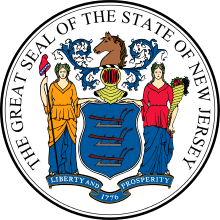Governor of New Jersey
| Governor of New Jersey | |
|---|---|
|
Seal of New Jersey | |
| Style | The Honorable |
| Residence | Drumthwacket |
| Term length | Four years, renewable once consecutively |
| Inaugural holder |
William Livingston 1776 |
| Formation | New Jersey State Constitution |
| Website | Office of the Governor |
The Governor of the State of New Jersey is head of the executive branch of New Jersey's state government. The office of governor is an elected position, for which elected officials serve four-year terms. Governors cannot be elected to more than two consecutive terms, but there is no limit on the total number of terms they may serve.[1] The official residence for the governor is Drumthwacket, a mansion located in Princeton, New Jersey; the office of the governor is at the New Jersey State House in Trenton. The first Governor of New Jersey was William Livingston, who served from August 31, 1776, to July 25, 1790. The current governor is Chris Christie, who assumed office on January 19, 2010, and was elected for his second term on November 5, 2013.
Role
The governor is directly elected by the voters to become the political and ceremonial head of the state. The governor performs the executive functions of the state, and is not directly subordinate to the federal authorities. The governor assumes additional roles, such as being the Commander-in-Chief of the New Jersey National Guard forces (when they are not federalized).
Unlike many other states that have elections for some cabinet-level positions, under the New Jersey Constitution the governor and lieutenant governor are the only officials elected on a statewide basis. Much like the President of the United States, the governor appoints the entire cabinet, subject to confirmation by the New Jersey Senate. More importantly, under the New Jersey constitution, the governor appoints all superior court judges and county prosecutors, although this is done with strong consideration of the preferences of the individual state senators who represent the district where vacancies arise.
The governor is also responsible for appointing two constitutionally created officers, the New Jersey Attorney General and the Secretary of State of New Jersey, with the approval of the senate.[2]
State law allows for a maximum salary of $175,000.[1] Jon Corzine accepted a token salary of $1 per year as governor.[3] Jim McGreevey, his predecessor, took home an annual salary of $157,000.[4]
Lieutenant governor
On Election Day, November 8, 2005, the voters passed an amendment to the New Jersey State Constitution that created the position of Lieutenant Governor of New Jersey, effective with the 2009 elections. Before this amendment was passed, the president of the New Jersey Senate would have become governor or acting governor in the event that office of governor became vacant. This dual position was more powerful than that of an elected governor, as the individual would have had a major role in legislative and executive processes. As a result of the constitutional amendment passed in 2005, Governor Richard Codey was the final person to wield such power.
Monmouth Sheriff Kim Guadagno was sworn in as New Jersey's first lieutenant governor, on January 19, 2010, under Governor Chris Christie.
Center on the American Governor
The Center on the American Governor,[5] at Rutgers' Eagleton Institute of Politics, was established in 2006 to study the governors of New Jersey and, to a lesser degree, the governors of other states. Currently the program features extensive archives of documents and pictures from the Byrne and Kean administrations, video interviews with many members of the respective administrations, some information on other American governors, and news updates on current governors (of all 50 states). The project is in the process of creating new archives, similar to the Byrne and Kean archives, for later administrations.[6]
See also
- List of Governors of New Jersey
- List of colonial governors of New Jersey
- Governorship of Chris Christie
References
- 1 2 "Frequently Asked Questions". Retrieved July 5, 2011.
- ↑ Wikisource:New Jersey Constitution of 1947#SECTION IV 2
- ↑ Chen, David W. (October 4, 2006). "The Goldman Sachs Crew That's Helping Run Trenton Government". Article. New York Times Company. p. 2. Retrieved 2008-08-26.
- ↑ Frequently Asked Questions: What is the Governor of New Jersey's salary?, accessed October 5, 2006.
- ↑ Eagleton Institute of Politics (2011). "Center on the American Governor". Eagleton Institute of Politics. New Brunswick, New Jersey, USA: Rutgers University. Retrieved November 10, 2011.
- ↑ Eagleton Institute of Politics (2011). "About the Center on the American Governor". Center on the American Governor. New Brunswick, New Jersey, USA: Rutgers University. Retrieved November 10, 2011.
External links
| Wikimedia Commons has media related to Governors of New Jersey. |
| United States order of precedence (ceremonial) | ||
|---|---|---|
| Preceded by Vice President |
Order of Precedence of the United States Within New Jersey |
Succeeded by Mayor of municipality in which event is held |
| Succeeded by Otherwise Speaker of the U.S. House of Representatives | ||
| Preceded by Governor of Pennsylvania |
Order of Precedence of the United States Outside New Jersey |
Succeeded by Governor of Georgia |
